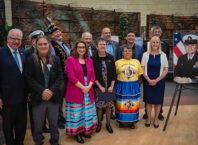FIRST NATIVE AMERICAN FEDERAL JUDGE
CONFIRMED BY SENATE
WASHINGTON, DC – Hopi citizen Diane
Humetewa made history on May 14 when the United States Senate
confirmed her to serve on the federal bench as judge for the U.S.
District Court for Arizona, the first American Indian woman to serve
in the federal judiciary.
Sen. Jon Tester (D-Mont.), chairman of
the Committee on Indian Affairs applauded Humetewa’s appointment.
“Diane Humetewa is an inspiration to Native people, especially
Native women across Indian Country. This is an important appointment
and long overdue. I’m pleased that the Senate came together in a
bipartisan way to get this done. As the only Native American in
active service on the federal bench, Diane provides much-needed
expertise on the complexities of federal law and Indian sovereignty.”
Until her confirmation, Humetewa
served as Special Advisor to the President and Special Counsel in the
Office of General Counsel at Arizona State University. She is also a
Professor of Practice at Arizona State University’s Sandra Day
O’Connor College of Law.
From 2002 to 2007, Humetewa was an
Appellate Court Judge for the Hopi Tribe Appellate Court. From 2009
to 2011, Humetewa was Of Counsel with Squire, Sanders & Dempsey
LLP. She worked in the United States Attorney’s Office in the
District of Arizona from 1996 to 2009, serving as Senior Litigation
Counsel from 2001 to 2007 and as the United States Attorney from 2007
to 2009. During her tenure in the United States Attorney’s Office,
Humetewa also served as Counsel to the Deputy Attorney General from
1996 to 1998.
From 1993 to 1996, she was Deputy
Counsel for the United States Senate Committee on Indian Affairs.
Humetewa received her Juris Doctor in 1993 from Arizona State
University College of Law and her Bachelor’s of Science in 1987
from Arizona State.
On February 27, the Senate Judiciary
Committee approved Humetewa’s nomination. Previously, Humetewa
served as a prosecutor and an appellate court judge for the Hopi
Nation, and was the first Native American woman to serve as a U.S.
Attorney.
INTERNATIONAL RELIGIOUS LEADER DECRIES
PIPELINE
FORT MCMURRAY, CANADA – Anglican
archbishop Desmond Tutu called Alberta’s tar sands “filth”
created by greed at a May conference on oil development and treaty
rights and urged all sides to work together to protect the
environment and indigenous rights.
“The fact that this filth is being
created now, when the link between carbon emissions and global
warming is so obvious, reflects negligence and greed,” Tutu told
over 200 conference attendees. “The oil sands are emblematic of an
era of high carbon and high-risk fuels that must end if we are
committed to a safer climate.”
“Oil sands development not only
devastates our shared climate, it is also stripping away the rights
of First Nations and affected communities to protect their children,
land and water from being poisoned.”
Tutu has criticized the oil sands
before.
The archbishop, who won the Nobel
Peace Prize for his role in the fight against apartheid, has taken
strong stands on climate change and against projects such as the
Keystone XL pipeline. Tutu has signed a petition against the project.
In an opinion column earlier this year in the British newspaper the
Guardian, the 82-year-old called the Keystone proposal to move oil
sands bitumen from Alberta to the U.S. appalling.
He has also called for boycotts of
events sponsored by the fossil fuel industry, for health warnings on
oil company ads and for divestment of oil industry investments held
by universities and municipalities, similar to measures that were
brought against South Africa’s old apartheid regime.
NAVAJO PANEL OKS DEAL TO END TRUST-FUND
SUIT
WINDOW ROCK, AZ – The Navajo Nation
Council approved a $554 million agreement to end litigation over the
U.S. government’s alleged mismanagement of the tribe’s trust-fund
assets.
Officials at the tribal headquarters in
Window Rock said May 30 that the council voted 13-3 to approve the
deal. Execution of the agreement and payment to the tribe is
contingent on final review and approval of the terms by Navajo Nation
President Ben Shelly and the U.S. Departments of Justice, Interior
and Treasury.
The tribe originally filed its lawsuit
against the federal government in December 2006. It alleges that the
U.S. breached its fiduciary obligations under treaties, executive
orders, federal statutes and regulations and contractual documents.
The suit also says the federal
government failed to manage, invest and account for tribal trust
funds and resources.
MONTANA TRIBE CLOSER TO FEDERAL
RECOGNITION
HELENA, MT. – The Little Shell Tribe
of Chippewa Indians in Montana are closer to federal recognition.
The tribal council Chairman Gerald
Gray spoke with Gov. Steve Bullock in early May and Gray said the
recently proposed rule changes for recognizing American Indian tribes
would put a nod from the U.S. government within their reach.
Federal officials say the proposed
rule changes are in the midst of a months-long finalization process.
The landless tribe has been recognized
by the state of Montana since 2000. With about 4,500 members loosely
centered in Great Falls, federal recognition could bring the tribe
land, along with housing and education assistance.
Gray, Bullock and others met as part
of the annual Tribal Leaders Summit at the State Capitol in Helena.
HARVARD PROJECT NAMES THREE HONORING
NATIONS LEADERS
CAMBRIDGE, MA – Two Ojibwe and one
Lakota tribal citizens were selected for the Harvard Project on
American Indian Economic Development’s 2014 Honoring Nations
Leadership Program.
Karen Cary, Leech Lake Tribal College
Career & Technical Education director, Justin Beaulieu, Red Lake
Nation Constitutional Reform Initiative coordinator and Amber Annis,
a Cheyenne River Sioux Tribal citizen and University of Minnesota
American Studies doctoral candidate were selected in May to
participate in the Harvard program.
As director, Cary’s responsibilities
include assuring hands-on teaching match job skills identified by
employers for students at Leech Lake Tribal College. Students learn
the skills and knowledge for employment in law enforcement,
carpentry, business management or electrical. In addition, the
department offers custom training and continuing education
opportunities for brushing up on or advancing skills in many fields
of study.
Coordinating the Red Lake
Constitutional Reform Initiative for Beaulieu involves working with a
13-member committee of Red Lake Band citizens who represent a
cross-section of the tribe. Each area of representation on the
committee was selected by the tribal council to ensure the revised
Constitution is crafted to reflect the importance of Ojibwe language,
culture and way of life, while also realistically addressing the
current and evolving needs of the tribe.
Annis is currently a doctoral student
in the American Studies department at the University of Minnesota.
She received her B.A. in History and American Indian Studies at the
University of North Dakota where she also received an M.A. in
History. She is a Cheyenne River Sioux Tribal citizen and her
research interests include American Indian education and history in
the 20th century and American Indian cultural and public diplomacy
during the Cold War era.
The Honoring Nations program,
supported by the Bush Foundation, is designed to foster
nation-building capacity in the Bush Region: Minnesota, North Dakota
and South Dakota and provides the opportunity for the participants to
contribute to the 2014 Honoring Nations awards cycle, which will
include participation on a site visit and reporting to the Honoring
Nations Board of Governors. Nation-building leaders will also have
the opportunity to participate in a tribal governance session
facilitated by the Native Nations Institute.
SENATE CONFIRMS FIRST NATIVE AMERICAN
AMBASSADOR
WASHINGTON, DC – The Senate confirmed
Keith Harper as ambassador to the United Nations Human Rights Council
on June 3, making him the first Native American to ever become a U.S.
Ambassador.
Harper is an attorney who was one of
the lawyers behind a landmark class action lawsuit brought by Native
Americans against the federal government. President Barack Obama
first nominated him in June 2013.
A Cherokee Nation citizen, Harper
helped represent around 500,000 Native American who brought a
class-action suit – Cobell vs. Salazar – against the United
States in the 1990s over alleged federal mismanagement of revenue
from mines and oil wells owned by Native Americans.
Senate Republicans objected to his
confirmation due to his involvement in the Cobell case and his role
as a bundler for Obama’s campaign.
Harper’s confirmation was approved by
a party-line vote of 52-42 and was hailed by Native American groups
as a positive step forward.
SEMINOLE TRIBE OF FLORIDA SEEKS TO
ACQUIRE BANK
HOLLYWOOD, FLA – The Seminole Tribe
of Florida is seeking approval to form a bank and rescue the ailing
Valley Bank in Fort Lauderdale.
The $84.3 million-asset bank was
“critically undercapitalized” as of March 31 and in danger of
failing without a buyer or a capital infusion.
On May 27, the Federal Deposit
Insurance Corp. received an interim merger application from Seminole
Bank to merge with Valley Bank. The problem is that Seminole Bank,
which listed the same address on Broward Boulevard as Valley Bank,
doesn’t exist at the moment.
There is no active Seminole Bank,
according to FDIC data and Florida corporate records. The last
institution known as Seminole Bank ceased operating in 1998 in the
town of Seminole. Yet, there could be a new one soon.
Florida Office of Financial Regulation
spokeswoman Jamie Mongiovi said her office received documents from
the Seminole Tribe on May 23 and the OFR returned those documents to
the tribe on May 28 with information about how to complete an
application to acquire Valley Bank.
OKLAHOMA SCHOOL BARS FEATHERS AT
GRADUATION
SEMINOLE COUNTY, OK – Officials at
Seminole High School told Native American students that wearing their
feathers at their graduation ceremony in late May.
Parents of senior Sefuan White, Amari
White (Seminole, Creek, Choctaw and Chickasaw) said their son, along
with three other cousins, had their eagle feathers prepared for the
graduation ceremony but were told by Principal Michael Crawford that
they would not be allowed to wear them.
In an interview with media, Crawford
defended his position, “no one is allowed to put anything on their
graduation caps, although there is no rule, that is our Seminole
(high school) tradition, we don’t put anything on them.”
According to a Public School Review
online record, Seminole High School – the mascot of which, is
designated as The Chieftains – has a 49 percent Native American
makeup.
The graduation was held on May 22 with
25 Native American graduates.






